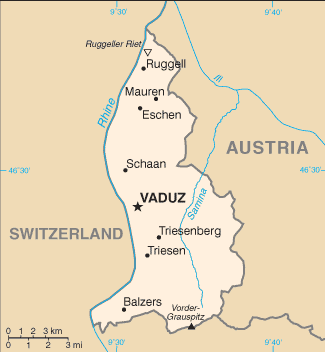Liechtenstein

Liechtenstein is a tiny principality - just 62 square miles - sandwiched between Austria and Switzerland in the middle of the Alps. The river Rhine forms its western border and much of the country is made up of mountains. It is also (arguably) the last remaining remnant of the Holy Roman Empire.
Its very existence is one of those random historical happenstances: the Lordship of Vaduz and the County of Schellenburg were purchased by the powerful Austrian von Liechtenstein family in the 17th/18th centuries in order to qualify for a seat in the Imperial Diet, as these two titles had no superior lord but the Holy Roman Emperor himself.
During the Thirty Years' War, Liechtenstein got over rather lightly; the Liechtenstein rulers sent out all six of their soldiers, and got seven back - they'd managed to miss all the fighting, and made a friend on the way back.
When Napoleon dissolved the Holy Roman Empire, the von Liechtensteins found themselves in charge of an independent country and finally got round to actually visiting it. However, they were an Austrian noble family and mostly stayed in Vienna until the end of World War I brought Imperial Austria crashing down.
Since then, Liechtenstein has aligned itself more with Switzerland and today it is in many ways just another canton of Switzerland - it uses the Swiss postal system and the Swiss Franc as its currency, for instance. However, remaining independent allows it to be a tax haven and Liechtenstein's main source of wealth is from foreign companies taking advantage of its low corporation tax rate. In fact, Liechtenstein is the only country in the world with more registered companies than it has inhabitants. This has led to a minor spat with the US over the conflict between confidential banking and the prevention of money laundering. This status has recently been eroded somewhat by opening up accounts to the UK's tax body for them to have a look at.
Liechtenstein does however have some "real" companies of its own, such as Hilti who make a popular concrete fixing and Ivoclar Vivadent - producer of a large proportion of all the world's false teeth.
The crown on Liechtenstein's flag was added in 1937, after there had been confusion with the identical flag of Haiti at the 1936 Olympics.
Also won the 2003 Ignobel prize in economics due to the odd policy of the tourism board allowing the entire nation to be rented for a party.
And as an interesting bit of trivia from the BBC, Liechtenstein's current territory of 62 square miles is actually a recent expansion from 2006, due to a fluke found by modern measuring methods.
Due to expropriations of the ruling family's property and fallout from the Beneš decrees that expelled ethnic Germans and Hungarians, Liechtenstein had a long feud with Czechoslovakia, taken so far as to not have relations with The Czech Republic and Slovakia after the Velvet Divorce. This policy was finally changed as they established diplomatic relations with the Czech Republic in July 2009, and Slovakia five months later.
Holds the record for possibly the youngest leader ever elected in Europe, after Mario Frick won elections in 1993 and became Prime Minister aged 28. He was in office until 2001.
Liechtenstein does not have an army, having dissolved it in 1868.
It was also once invaded by the Swiss. By accident. Apparently a commando group got lost after taking a wrong turn somewhere. Make of that what you will.
Random trivia note: It, along with Uzbekistan, is one of the only two doubly landlocked countries in the world. This means it only borders other landlocked countries, so a person has to cross two borders to find a sea.
